
ANNUAL REPORT 2021-22
With 215 tenured/tenure-track faculty and 18 multidisciplinary research centers and institutes with funding by eight federal agencies, the College of Engineering is a leader in experiential education and interdisciplinary research focused on discovering solutions to global challenges to benefit society.
Founded in 1898, Northeastern is a global research university and the recognized leader in experiential lifelong learning. Our approach of integrating real-world experience with education, research, and innovation empowers our students, faculty, alumni, and partners to create worldwide impact.
Northeastern’s comprehensive undergraduate and graduate programs lead to degrees through the doctorate in nine colleges and schools across our global system of campuses. Learning is personalized and experiential, with a curriculum that emphasizes the intersection of data, technology, and human literacies—uniquely preparing graduates for lives of fulfillment and accomplishment.
Our research enterprise, with an R1 Carnegie classification, is solutions-oriented and spans the world. Our faculty scholars work in teams that cross not just disciplines, but also sectors— aligned around today’s highly interconnected global challenges and focused on transformative impact for humankind.
4 NORTHEASTERN UNIVERSITY ELECTRICAL AND COMPUTER ENGINEERING
DEAR COLLEAGUES, FRIENDS, AND STUDENTS,
It is my great pleasure to report that the Department of Electrical and Computer Engineering at Northeastern University had another very successful academic year during 2021-2022. Our faculty were awarded over $40 million in research grants. Some highlights include Michael Silevitch, Robert D. Black College of Engineering Distinguished Professor, who was awarded, after an eight month nationwide competition, a 10-year, $36 million grant to lead the Department of Homeland Security (DHS) multiinstitutional Center of Excellence SENTRY (Soft target Engineering to Neutralize the Threat Reality). Also, University Distinguished Professor Eduardo Sontag and collaborators received a $7.5 million DOD MURI award for “Rules of Composition in Synthetic Biology Across Scales of Complexity: Theory and Tools.”

In 2022, outstanding faculty joined our department, including Professor Ken Duffy from National University of Ireland, Maynooth; Professor Ravinder Dahiya from University of Glasgow, UK; and Professor Mauricio Santillana from Harvard University. They have each demonstrated outstanding research scholarship and are established leaders in their fields. In addition, we welcomed four excellent junior-level tenure-track faculty, including Derya Aksaray, Michael Everett, Soner Sonmezoglu, and Mathew Yarossi. College of Engineering Distinguished Professor David Kaeli was elevated to Fellow of the Association for Computing Machinery (ACM), Professor Hanumant Singh became a Fellow of the IEEE, and Professor Charles DiMarzio became a Fellow of SPIE. The year also saw three of our assistant professors—Sarah Ostadabbas, Aatmesh Shrivastava, and Devesh Tiwari—recognized with NSF CAREER Awards, and Assistant Professor Mahdi Imani the recipient of the NIH Trailblazer Award. Northeastern’s studentled electric racing team placed second in the 2022 Formula Hybrid+Electric Competition.
We added two new master’s degrees to our department offerings, including an MS in Internet of Things and an MS in Wireless and Network Engineering. We also continue to expand our MS programs to Northeastern’s Seattle, Washington, and Portland, Maine locations. With a deep-rooted focus in experiential education and research excellence, our ECE department at Northeastern is continuing to train a more equitable and diverse engineering workforce.
Sincerely,
For more details, visit our website at
Photo by Matthew Modoono
Srinivas Tadigadapa, PhD Chair of Electrical and Computer Engineering s.tadigadapa@northeastern.edu
ECE.NORTHEASTERN.EDU.
We are a leader in experiential education and interdisciplinary research, focused on Engineering for Society
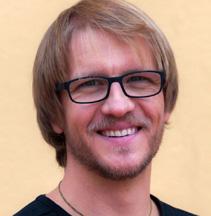
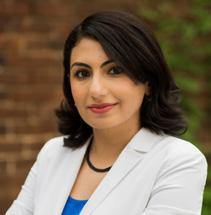

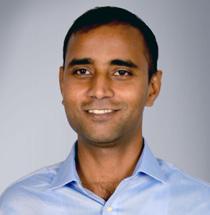
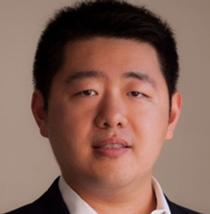
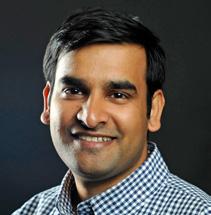
2 NORTHEASTERN UNIVERSITY ELECTRICAL AND COMPUTER ENGINEERING Quick Facts electrical and computer engineering Doctoral Students Masters Students Bachelor’s Students TENURED/ TENURE-TRACK Faculty External Research Awards (2022) 2% DHHS 42% NSF 17% Foundation/Non-Profit 11% DOD 1% Federal/Other 19% Industry/Corporation 8% DOE Young Investigator Awards, including Professional Society Fellowships, including National Science Foundation CAREER Awards IEEE Fellows 47 45 23 29616 429 891 75 $40M 2022 NSF CAREER Award Recipients Promotions Sarah Ostadabbas Assistant Professor Devesh Tiwari Associate Professor Pau Closas Associate Professor Devesh Tiwari Associate Professor Yanzhi Wang Associate Professor Aatmesh Shrivastava Assistant Professor Graduate Student Enrollment (Fall 2021) Up 30% vs. 2016 The department offers 8 research concentrations and is either the lead or partner of 12 federally-funded research centers and institutes. Newest Research Centers and Institutes Soft target Engineering to Neutralize the Threat Reality Center for Hardware and Embedded Systems Security and Trust Institute for Experiential AI Institute for Experiential Robotics Institute for the Wireless Internet of Things Northeastern SMART Center Quick Facts college of engineering 116 102 Engineering Departments5 YOUNG INVESTIGATOR Awards Professional Society Fellowships Total Co-op Hires (2022) Co-op Employer Partners (2020-2022) TOTAL ENROLLMENT (Fall 2021) 54% Graduate 46% Undergraduate8,542 2,897 2,200 Including 64 NSF CAREER Awards, and 18 DOD Young Investigator Awards With 215 tenured/tenure-track faculty and 18 multidisciplinary research centers and institutes with funding by eight federal agencies, the College of Engineering is a leader in experiential education and interdisciplinary research focused on discovering solutions to global challenges to benefit society. 48% MS 31% PhD 11% BS Enrollment Growth (2016 to 2021)
Our Newest Faculty
Derya Aksaray
Assistant Professor
PhD: Georgia Institute of Technology, 2014
Previously: Assistant Professor, University of Minnesota
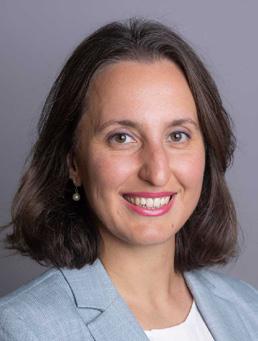
Scholarship Focus: Autonomous systems, control theory, formal methods, machine learning, and aerospace systems
Ravinder Dahiya Professor
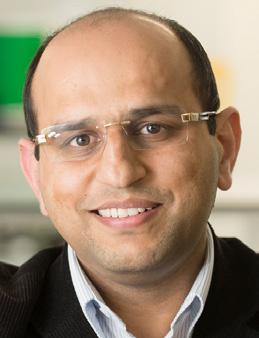
PhD: Italian Institute of Technology, 2009
Previously: Professor and EPSRC Research Fellow, James Watt School of Engineering, University of Glasgow, UK
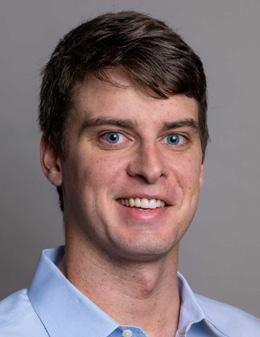
Scholarship Focus: Flexible printed electronics, robotics (soft robotics), electronic skin, tactile sensing, haptics, intelligent interactive systems, wearable systems
Awards:
• Fellow, IEEE
• Fellow, The Royal Society of Edinburgh
• Life Member, Marie Curie Fellows Assoc.
Ken Duffy Professor
Jointly Appointed: Mathematics
PhD: Trinity College, Dublin, 2000
• Fellow, The Institution of Engineers in Scotland
• Microelectronic Engg Young Investigator Award, 2016
• IEEE Sensors Council Technical Achievement Award, 2016
Previously: Co-director of the Science Foundation Ireland Centre for Research Training in Foundations of Data Science; and Director, Hamilton Institute, National University of Ireland Maynooth Scholarship Focus: Algorithms for communication systems, the life sciences, and DNA forensics
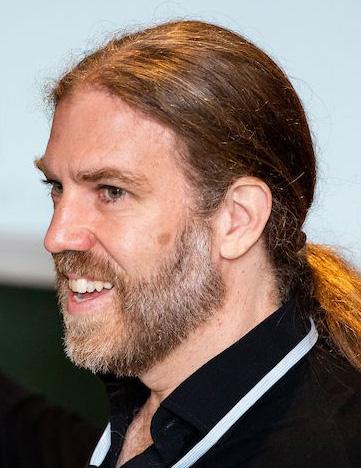
Michael Everett
Assistant Professor
Jointly Appointed: Khoury College of Computer Sciences
PhD: Massachusetts Institute of Technology, 2020
Previously: Research Scientist, Massachusetts Institute of Technology
Scholarship Focus: Robotics, motion planning, control theory, neural network verification, reinforcement learning
Mauricio Santillana Professor
Jointly Appointed: Physics
PhD: University of Texas, Austin, 2008
Previously: Assistant Professor, Harvard Medical School and Harvard T.H. Chan School of Public Health Scholarship Focus: Modeling of geographic patterns, fluid flow, and atmospheric global pollution transport; disease outbreak prediction platforms; mathematical solutions to healthcare
More New Faculty members listed on the next page.
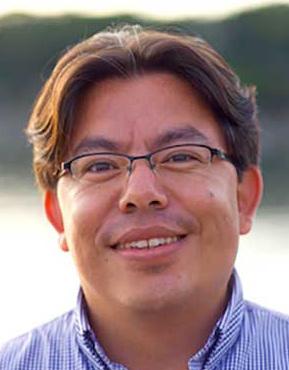
3ANNUAL REPORT 2021-2022
Newest Faculty
Soner Sonmezoglu
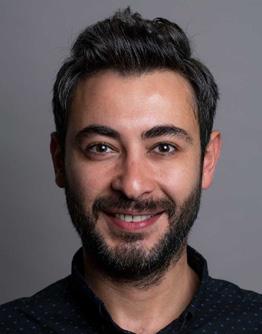
Assistant Professor
PhD: University of California, Davis, 2017
Previously: Research Scientist and Postdoctoral Scholar, University of California, Berkeley
Scholarship Focus: Low power integrated circuits and systems; micro/nanofabrication; wireless biomedical devices and systems; neural interfaces; closed-loop therapeutic systems
Mathew Yarossi
Assistant Professor
Jointly Appointed: Physical Therapy, Movement, and Rehabilitation Sciences
PhD: Rutgers University, 2017
Previously: Associate Research Scientist, Northeastern University
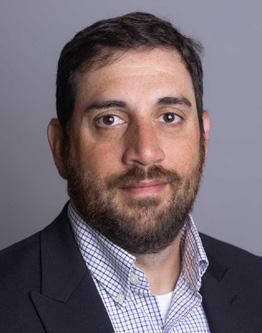
Scholarship Focus: Movement neuroscience, motor physiology, clinical research, physiological signal processing, and biomechanics
New Academic Programs
MS in Internet of Things
The Internet of Things (IoT) revolution is reshaping how industries meet today’s most pressing challenges. Through the Master of Science in Internet of Things, students gain the interdisciplinary knowledge and skills to understand, design, and implement the autonomous wireless networked systems of tomorrow. Students take a combination of coursework, supervised research spanning multiple colleges at Northeastern University and the Institute for the Wireless Internet of Things, and/or gain industry experience with the cooperative education program.
MS in Wireless and Network Engineering
The Master of Science in Wireless and Network Engineering uniquely combines concepts from electrical engineering and computer engineering to provide a multifaceted understanding of the field. Through coursework and experiential learning, including research and/or industry experience with the co-op program, students master skills ranging from hardware design and electromagnetic characterization to communication techniques and networking protocols for present and future network generations—from 5G to 6G and beyond.
MS in Electrical and Computer Engineering with a concentration in Computer Networks and Security is now also offered at the Roux Institute in Portland, Maine. In addition to offering academic programs, the Roux Institute has research facilities for the Institute for the Wireless Internet of Things, and the Institute for Experiential AI.
4 NORTHEASTERN UNIVERSITY ELECTRICAL AND COMPUTER ENGINEERING
Our
Faculty by Research Area
Communications, Control & Signal Processing
Kaushik Chowdhury Pau Closas Ken Duffy Jennifer Dy Deniz Erdogmus Vinay Ingle Stratis Ioannidis Josep Jornet Hanoch Lev-Ari Jose Martinez Lorenzo Tommaso Melodia Sarah Ostadabbas Purnima Ratilal-Makris Francesco Restuccia Masoud Salehi Bahram Shafai Milad Siami Hanumant Singh Milica Stojanovic
Computer Networks & Security
Stefano Basagni Kaushik Chowdhury Ken Duffy Yunsi Fei Josep Jornet Engin Kirda Dimitrios Koutsonikolas Tommaso Melodia Francesco Restuccia Wil Robertson Mauricio Santitllana Xiaolin Xu
Computer Systems & Software
Yunsi Fei David Kaeli Mieczyslaw Kokar Dimitrios Koutsonikolas Miriam Leeser Xue Lin Fabrizio Lombardi Ningfang Mi Gunar Schirner Devesh Tiwari Yanzhi Wang Xiaolin Xu Edmund Yeh
Computer Vision, Machine Learning, & Algorithms
Derya Aksaray Octavia Camps Jennifer Dy Michael Everett Deniz Erdogmus Yun Raymond Fu Stratis Ioannidis Jose Martinez Lorenzo Waleed Meleis Sarah Ostadabbas Milad Siami Lili Su
Yanzhi Wang Mathew Yarossi
Electromagnetics & Optics
Charles DiMarzio Siddharth Ghosh Vincent G. Harris Yongmin Liu Edwin Marengo Jose Martinez Lorenzo Hossein Mosallaei Carey Rappaport Purnima Ratilal-Makris Michael B. Silevitch Milica Stojanovic Nian X. Sun Srinivas Tadigadapa
Microsystems & Devices
Cristian Cassella Ravinder Dahiya Siddharth Ghosh Yong-Bin Kim Nicol McGruer Marvin Onabajo Matteo Rinaldi Aatmesh Shrivastava Soner Sonmezoglu Nian X. Sun Srinivas Tadigadapa
Power Electronics, Systems & Controls
Ali Abur Mahshid Amirabadi Bradley Lehman Bahram Shafai Milad Siami Eduardo Sontag Mario Sznaier Robotics
Derya Aksaray Ravinder Dahiya Michael Everett Jose Martinez Lorenzo Taskin Padir Alireza Ramezani Bahram Shafai Milad Siami Hanumant Singh
5ANNUAL REPORT 2021-2022
$36 Million SENTRY DHS Center of Excellence to Protect Soft Targets
After an eight-month competition among the nation’s biggest universities, Northeastern, led by Michael Silevitch, Robert D. Black Distinguished Professor of electrical and computer engineering, has been awarded $36 million over 10 years to lead a new Department of Homeland Security (DHS) multi-institutional Center of Excellence, SENTRY (Soft target Engineering to Neutralize the Threat Reality). SENTRY will develop a Virtual Sentry Framework that provides just-in-time information to key decision makers to protect civilian soft targets such as transit stations and schools, and crowded spaces such as stadiums from covert threats.
The multi-institutional DHS Center of Excellence will create a Virtual Sentry Framework that provides just-in-time information to key decision makers to protect civilian soft targets such as transit stations and schools, and crowded spaces such as stadiums from covert threats.
The technology is focused solely on safeguarding civilian targets, but is similar to how the Pentagon sends information to team leaders to defend against a threat. The Virtual Sentry Framework will integrate elements such as crowd-scanning sensors mounted atop light poles, video feeds, cell phone traffic, aerial drone footage, and social media posts. That information will be sent to someone in charge―a school principal, for example―to decide what to do next.
Eleven universities will be working on the project. In addition to Northeastern, they are: Rutgers, Boston University, Tufts University, the University of Southern California, SUNY Buffalo, the University of Puerto RicoMayaguez, the University of Rhode Island, University of Florida, Rensselaer Polytechnic Institute, and Notre Dame.
Companies such as integrated systems providers Raytheon Technologies and Leidos will be part of
an industrial advisory board for SENTRY. Corporate business partners on the program could ultimately sell the technology to schools and churches, Silevitch says. But during the 10-year development stage it will be prototyped in a number of venues at no cost.
The system will be versatile enough to monitor soft targets of varying shapes and sizes, a strategic shift from older technologies that treated each target as a unique stand-alone location. “There’s such a wide variety of soft targets out there that if you try to focus on just one class, say schools, then that leaves out a whole set of other classes such as subway stations,” Silevitch says.
SENTRY should also handle various classes of threats as well, from a lone active shooter to a multi-pronged attack from a foreign power, he adds.
Key to Northeastern’s winning strategy was creating a multidisciplinary research program driven by the longrange goal of effectively protecting the vast array of soft targets.
“The four basic research thrusts were conceived at the outset to be part of an integrated whole, feeding off one another to solve these challenging problems,” says College of Engineering Distinguished Professor Carey Rappaport, electrical and computer engineering, and deputy director of SENTRY.
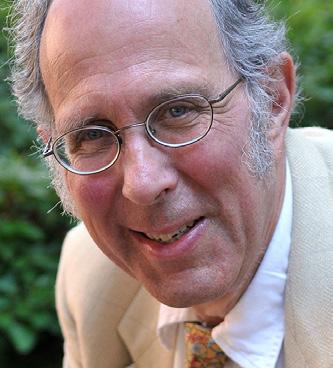
The program is part of DHS’s university-based network of Centers of Excellence. There are 10 centers nationally, each with a specific security focus. SENTRY will be funded through the department’s Office of University Programs.
Northeastern’s multidisciplinary expertise significantly helped in winning the federal contract. For example, properly designing a school space, architecturally, to make it difficult for a threat to penetrate a soft target, involved interactions between architecture experts at the university’s College of Arts, Media and Design. “That was a very important element of our strategy,” says Silevitch.
“It is an honor and a major responsibility to lead the SENTRY effort to help protect our nation against incipient soft target attacks,” he adds.
6 NORTHEASTERN UNIVERSITY ELECTRICAL AND COMPUTER ENGINEERING
$7.5M DoD MURI Award to Advance Synthetic Biology
University Distinguished Professor Eduardo Sontag, electrical and computer engineering, and bioengineering, and collaborators received a $7.5 million award for “Rules of Composition in Synthetic Biology Across Scales of Complexity: Theory and Tools.” The grant is funded by the Air Force Office of Scientific Research under the Multidisciplinary University Research Initiative (MURI) program. Collaborators include Massachusetts Institute of Technology and California Institute of Technology.
Synthetic biology aims to program biology for applications, such as biosensing, smart probiotics, and regenerative medicine. A major challenge to engineering synthetic biological circuits that behave as intended is the compositional context: Networks are not “plug and play” because behaviors of individual components change when other components are present. This forces a designer to re-optimize each component when other parts are added. The result is that circuits are designed in a monolithic fashion through brute-force parameter search, a lengthy process that is neither scalable, nor generalizable, and often leads to poor outcomes. Overcoming these challenges requires a rigorous, modular, and systematic design framework that explicitly accounts for the contextdependence of biomolecular processes and undesired interactions, which one tends to neglect in the design phase.
The goal of the new grant is to impact synthetic biology by changing the way one describes, characterizes, and designs genetic modules, through tools that will enable the systematic and scalable design of increasingly complex biomolecular decision-making systems. The core of the project will establish theoretical foundations and tools, grounded on the mathematics of dynamical systems, that will enable the compositional design of synthetic biology circuits while accounting for context. A control-theoretic framework will be developed for the composition of biomolecular processes to capture unintended connectivity due to the sharing of cellular resources in gene expression as well as a hierarchical design methodology. The theory will be validated through bacterial, mammalian, and cell-free testbeds to be developed by the experimentalists on the team.
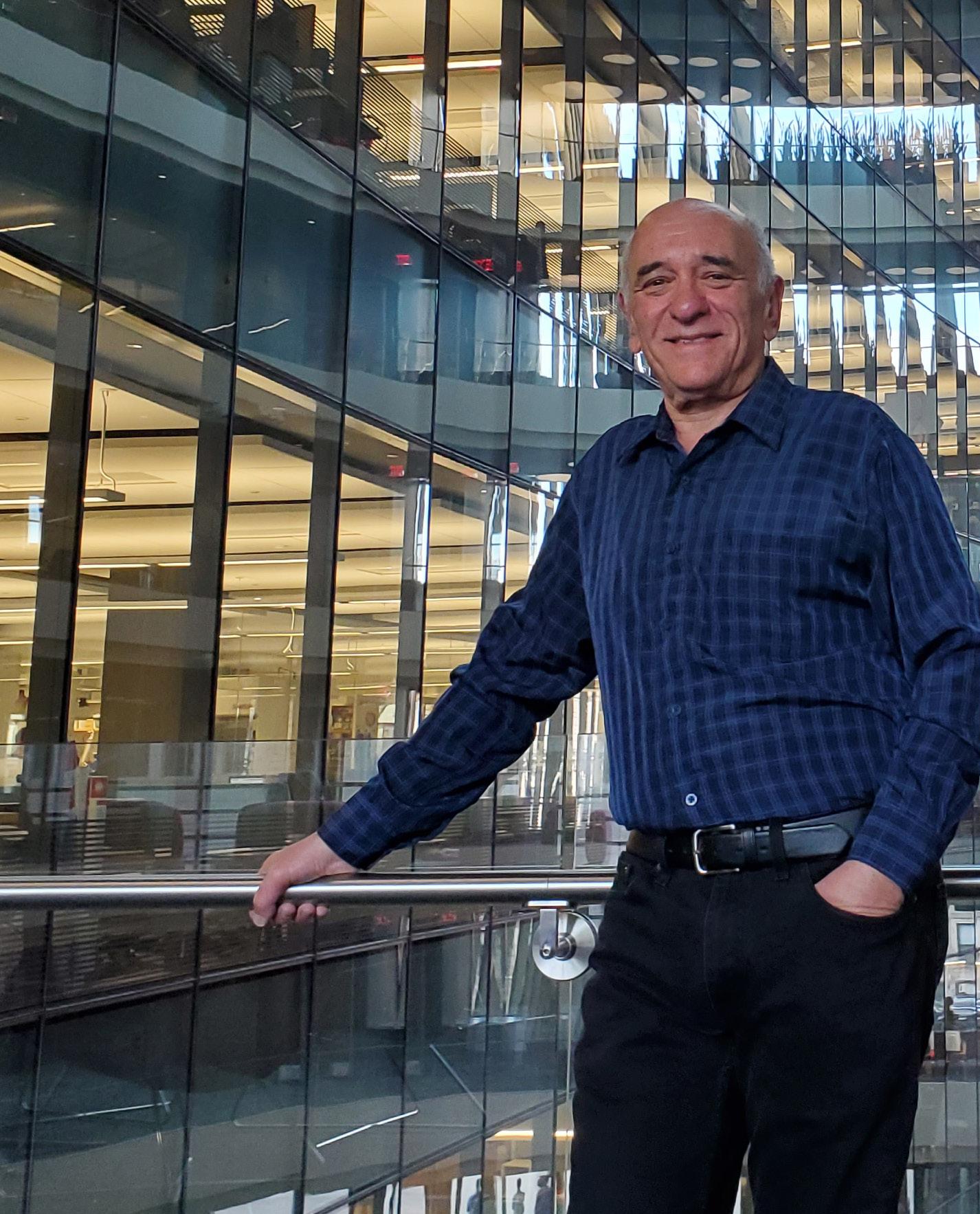
7ANNUAL REPORT 2021-2022
Faculty Fellows and Young Investigator Awards
ACM Fellow
College of Engineering Distinguished Professor David Kaeli, electrical and computer engineering, was selected as an Association for Computing Machinery (ACM) Fellow for his contributions to computer architecture and compilers. The ACM Fellows program recognizes the top 1% of ACM Members for their outstanding accomplishments in computing and information technology and/or outstanding service to ACM and the larger computing community.
IEEE Fellow and Lifetime Achievement Award
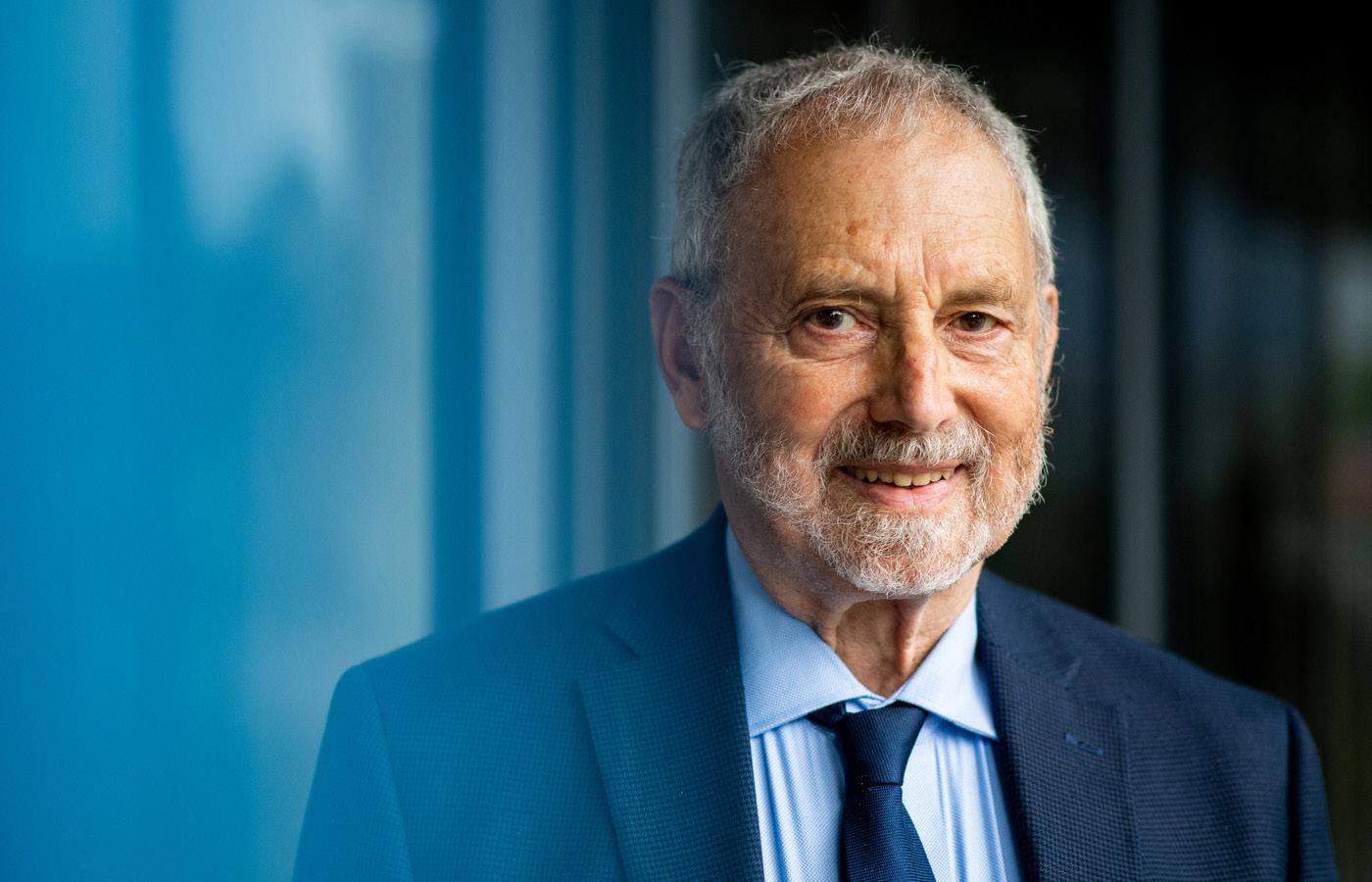
Professor Hanumant Singh, electrical and computer engineering, jointly appointed in mechanical and industrial engineering, has been elevated to an IEEE Fellow for his development of localization and mapping techniques and autonomous systems for marine and polar applications. IEEE Fellow is the highest grade of membership and is recognized by the technical community as a prestigious honor and an important career achievement. Singh also received the Lifetime Achievement Award from the IEEE Oceanic Engineering Society for his work on autonomous underwater vehicles.

Fellow of SPIE
Associate Professor Charles DiMarzio, electrical and computer engineering, was selected by the International Society for Optics and Photonics (SPIE) as a Fellow for his significant scientific and technical contributions in the multidisciplinary fields of optics, photonics, and imaging. SPIE Fellows are honored for their technical achievement and for their service to the general optics community and to SPIE in particular.
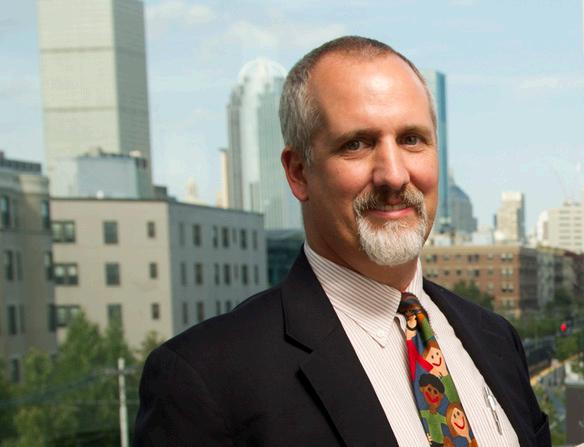
8 NORTHEASTERN UNIVERSITY ELECTRICAL AND COMPUTER ENGINEERING
Photo by Matthew Modoono
Photo by Matthew Modoono
NSF CAREER Award for Early Detection of Autism
Assistant Professor Sarah Ostadabbas, electrical and computer engineering, was awarded a $600K CAREER grant from the National Science Foundation for “Learning Visual Representations of Motor Function in Infants as Prodromal Signs for Autism.” Ostadabbas has conducted extensive studies of how infants’ body postures, facial expressions, and pacifier use behavior correlate with Autism Spectrum Disorder (ASD). Using pattern recognition and advanced AI, she’s created algorithms that can search for and identify the indicators linked to autism. With this grant, she’ll take it a step further: developing a targeted, AI-guided infant motor function monitoring and assessment system purposely built to uncover the relationship between certain infant behaviors and future ASD. While currently children with ASD aren’t diagnosed until an average age of four, this study could lead to much earlier diagnoses—and earlier interventions. The research will also include an underserved, lowincome population by partnering with the Puerto Rico Testsite for Exploring Contamination Threats (PROTECT) research center led by Northeastern.
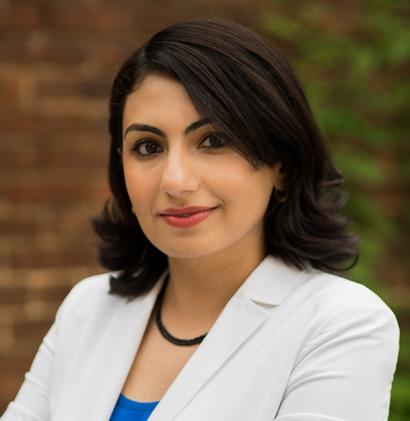
NSF CAREER Award to Use Ultra-low Power Analog Computing Circuits to Develop ML Hardware for Biomedical Devices
Assistant Professor Aatmesh Shrivastava, electrical and computer engineering, received a $500K National Science Foundation CAREER award for “An Ultra-low Power Analog Computing Hardware Design Framework for Machine Learning Inference in Edge Biomedical Devices.” A sometimes-overlooked technology, analog computing could hold the key to ultra-tiny wearable and implantable medical devices for monitoring seizures, sleep apnea, heart arrhythmia, and more. Compared to digital chips, analog chips are more energy-efficient and measure in just millimeters—five to ten times smaller than their digital counterparts. These minuscule chips fit into tiny health monitoring devices that a patient can wear at home instead of being tethered to a monitor in a hospital—a potential leap toward lower healthcare costs and more effective homebased care. Combined with machine learning technologies, this could yield a new generation of ultra-tiny “smart” devices that constantly improve their diagnostic capabilities.
NSF CAREER Award for More Reliable Quantum Computing
Associate Professor Devesh Tiwari, electrical and computer engineering, was awarded a $560K CAREER grant from the National Science Foundation for “Qurious: Methods for Making Erroneous Near-term Quantum Computers More Usable.” By design, quantum computers hold the power to solve complex problems in a fraction of the time that it would take a standard (or classical) computer. The catch is that their performance is very temperamental. The devices must be kept at extremely cold temperatures, and their outputs are riddled with errors. While the long-term goal is to reduce the errors, Tiwari’s research is providing a way to work around them. He will design and develop a robust system-software ecosystem to help high-performance computing (HPC) programmers better interpret the “noisy” outputs of quantum machines. More usable outputs from these computers could yield advances in finance, artificial intelligence, pharmaceutical development, and more.
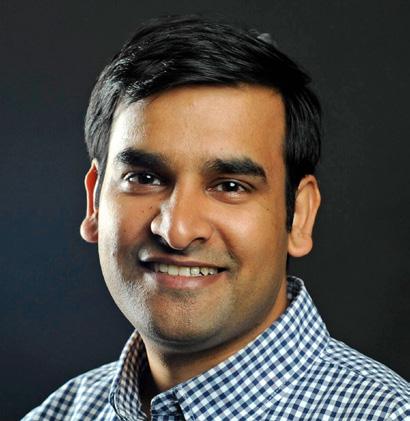
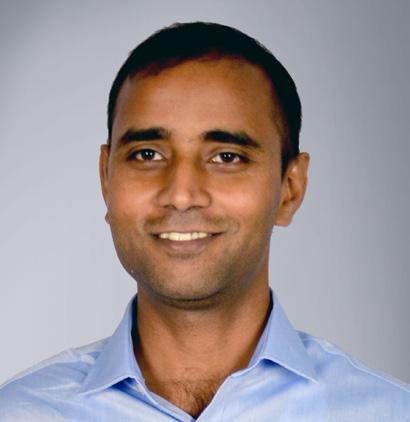
NIH Trailblazer Award for Mathematical Modeling of Microbial Communities
Assistant Professor Mahdi Imani, electrical and computer engineering, received a $590K National Institutes of Health (NIH) Trailblazer R21 Award for new and early-stage investigators from the National Institute of Biomedical Imaging and Bioengineering (NIBIB) for “Bayesian Dynamical Modeling of Microbial Communities.” He will develop highly scalable and efficient mathematical models and tools that will allow researchers to gain a deeper understanding of the fundamental biology of microbial communities and their system-level interactions. These interactions within microbial communities and their hosts are a source of interest for many researchers in areas from protecting humans and plants against diseases to developing the next generation of biofuels. With advances in high throughput multi-omics techniques like metagenomics, metatranscriptomics, exometabolomics, and proteomics, researchers have plenty of data to work with; what they need are appropriate tools and annotation databases for analysis and interpretation.
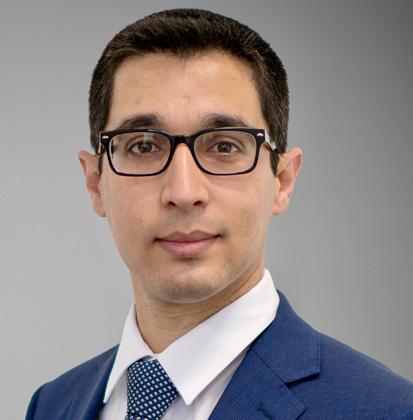
9ANNUAL REPORT 2021-2022
Faculty Honors and Awards
selected highlights
Charter Member of IEEE Computer Society Distinguished Contributors
Professor Miriam Leeser, electrical and computer engineering, was recognized as a charter member of the IEEE Computer Society Distinguished Contributor Program. The program was introduced in 2021 to showcase the immense combined technical expertise and innovation power of its membership while recognizing volunteer commitment.
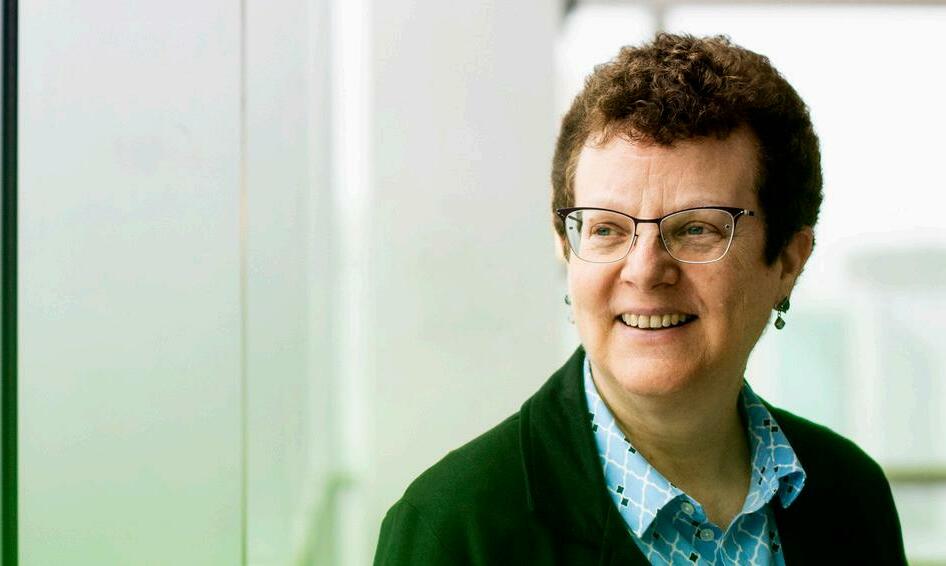
First Northeastern University Amazon Scholar
Taskin Padir, associate professor, electrical and computer engineering, and director of the Institute for Experiential Robotics, is Northeastern University’s first Amazon Scholar. The Amazon Scholar program partners with university professors from around the world with Amazon talent to work on large-scale and high-impact projects in the professor’s field of expertise. At the core of Padir’s work is the concept of shared autonomy between human workers and robots. As an Amazon Scholar, he will find innovative ways, through robotics, to improve last-mile delivery for Amazon’s drivers.
2022 Richard E. Bellman Control Heritage Award
University Distinguished Professor Eduardo Sontag, electrical and computer engineering, jointly appointed in bioengineering, received the 2022 Richard E. Bellman Control Heritage Award—the highest recognition in control theory and engineering in the United States. He was honored “for pioneering contributions to stability analysis and nonlinear control, and for advancing the control theoretic foundations of systems biology.”
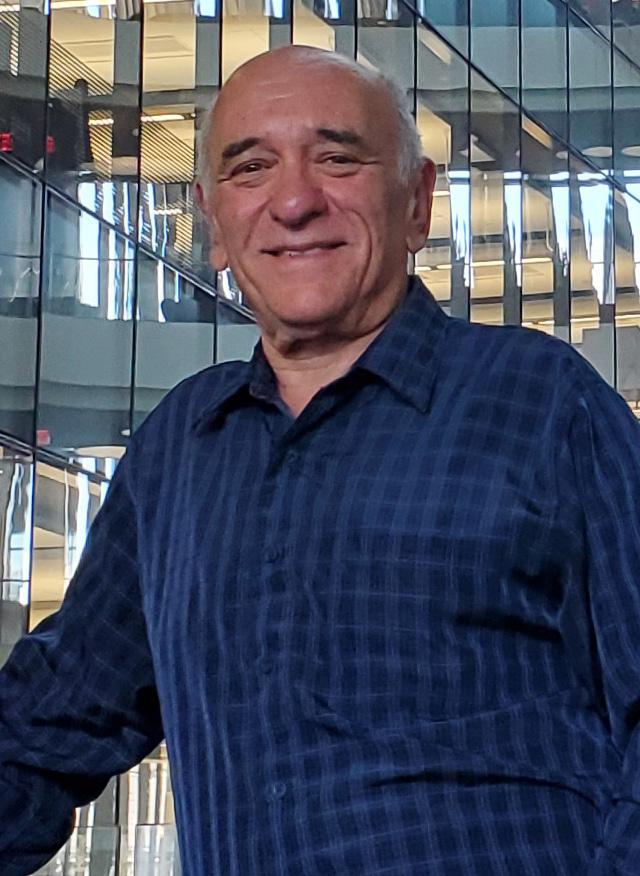
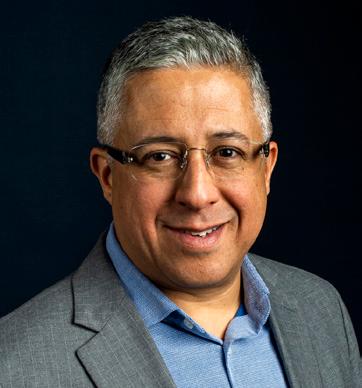
SPIE Senior Member
Associate Professor Yongmin Liu, mechanical and industrial engineering, jointly appointed in electrical and computer engineering, was selected as a senior member of the International Society for Optics and Photonics (SPIE). SPIE Senior Members are members of distinction honored for their professional experience, their active involvement with the optics community and SPIE, and/or significant performance that sets them apart from their peers.
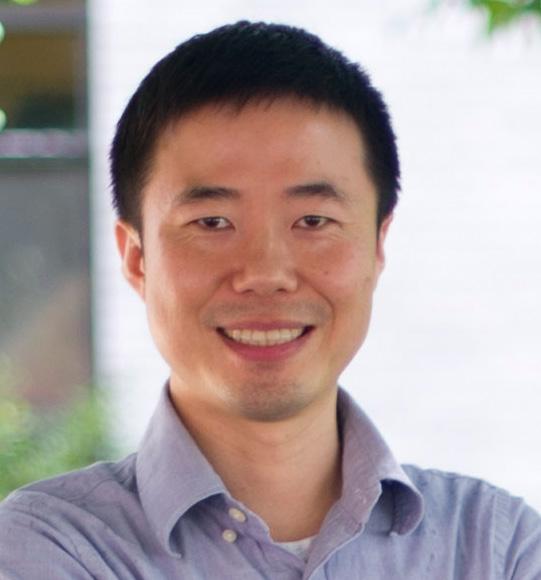
Emerging Leader Abie Award
Kris Dorsey, associate professor of electrical and computer engineering, jointly appointed in Bouve College of Health Sciences, is a 2022 Emerging Leader Abie Award winner from AnitaB.org. In honor of Denice Denton, the first female dean of an engineering school at a major U.S. research university, the Emerging Leader Award is given to a junior, non-tenured faculty member for high quality research and significant impact on diversity.
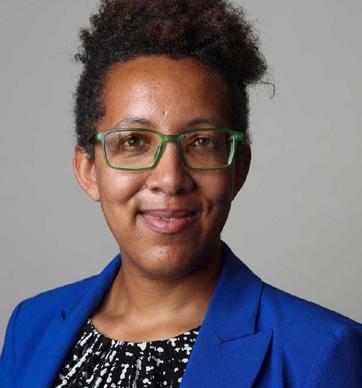
10 NORTHEASTERN UNIVERSITY ELECTRICAL AND COMPUTER ENGINEERING
Photo by Ruby Wallau
Elected Member of Academia Europaea
Professor Yun Raymond Fu, electrical and computer engineering, jointly appointed in Khoury College of Computer Sciences, was elected a Member of Academia Europaea (The Academy of Europe). Membership is for individuals that have demonstrated “sustained academic excellence” and is by invitation only by existing MAE and judged during a peer-review selection process.
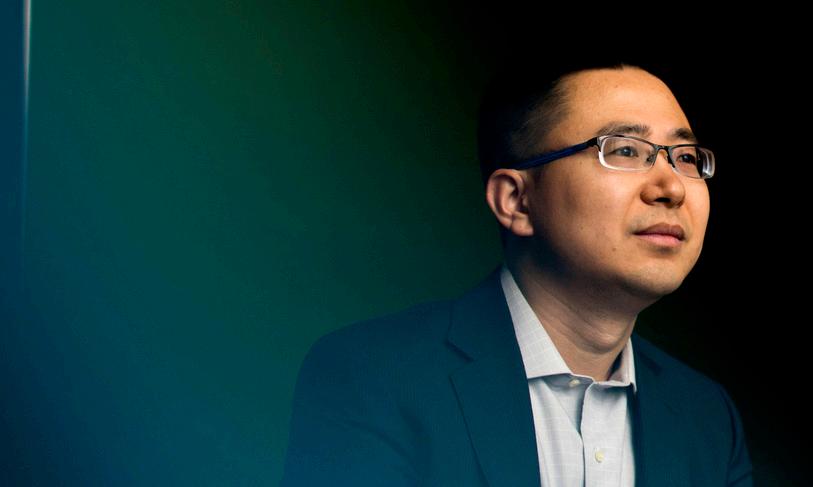
Lab Spinout Finalists in Massachusetts Innovation Network’s Competition
Three electrical and computer engineering lab spinouts were selected as finalists for the Massachusetts Innovation Network’s innovation competition, The Eddies. Formerly known as NE Innovation Awards, The Eddies is the oldest and longest running innovation competition in New England.
DeepCharge, which is a spinout company from the lab of Professor Kaushik Chowdhury and Research Assistant Professor Yousof Naderi, electrical and computer engineering, is creating innovative technologies that radically simplify wireless charging. They have developed the world’s first intelligent and programmable wireless charging platform. With its advanced on-device AI technology, the platform can transform any surface into a contactless multi-device wireless charger for any device, including laptops. Naderi was a PhD student advised by Chowdhury.
AInnovation Labs, is a spinout of Professor Yun Raymond Fu, electrical and computer engineering. It uses patented deep learning model compression techniques to port once costly AI algorithms into lightweight processes that can run in real-time on mobile devices. The algorithms enable complex computer vision programs such as human pose tracking, behavioral recognition, and motion capturing to run on limited hardware. As a result, more users can incorporate cutting-edge innovation into applications such as telemedicine, remote rehab, virtual-first care, and in-home fitness.
Hydronet is a spinout of the lab of William Lincoln Smith Professor Tommaso Melodia and Research Assistant Professor Emrecan Demirors, electrical and computer engineering. It is revolutionizing highspeed wi-fi for underwater purposes. Their efficient, scalable, and secure software-defined platform enables real-time, high-speed data exchange and communication underwater.
Early Achievement Award and IEEE Distinguished Lecturer
Associate Professor Josep Jornet, electrical and computer engineering, received the 2022 IEEE Radio Communications Committee (RCC)
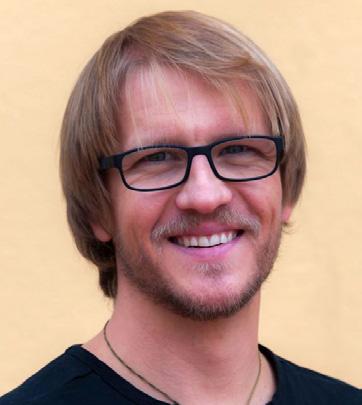
Early Achievement Award and was selected as an IEEE Communications Society (ComSoc) Distinguished Lecturer for 2022 and 2023.
IEEE AESS Harry Rowe Mimno Award
Associate Professor Pau Closas, electrical and computer engineering, received the Harry Rowe Mimno Award from the IEEE Aerospace and Electronic Systems Society (AESS) for his paper “State Estimation Methods in Navigation: Overview and Application.”
Learn more about our accomplished faculty
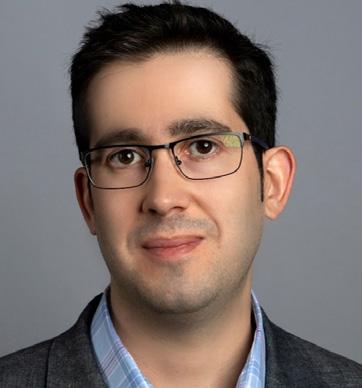
11ANNUAL REPORT 2021-2022
Photo by Matthew Modoono
Faculty Grants and Publications
highlights
$3M NIH MERIT Award to Understand Human Dexterity and Inform Robotic Object Manipulation Research
University Distinguished Professor Dagmar Sternad, biology, electrical and computer engineering, and physics, and core faculty in the Institute for Experiential Robotics, has been awarded a $3 million MERIT Award from the National Institutes of Health to investigate human sensorimotor control of dynamically complex objects. The research will take a control-theoretic and dynamical systems approach to understand human dexterity and the insights gained will be used to improve assessment of severity in stroke patients and inform research on robotic manipulation of deformable objects. Dr. David Lin from Massachusetts General Hospital is collaborator on the project.
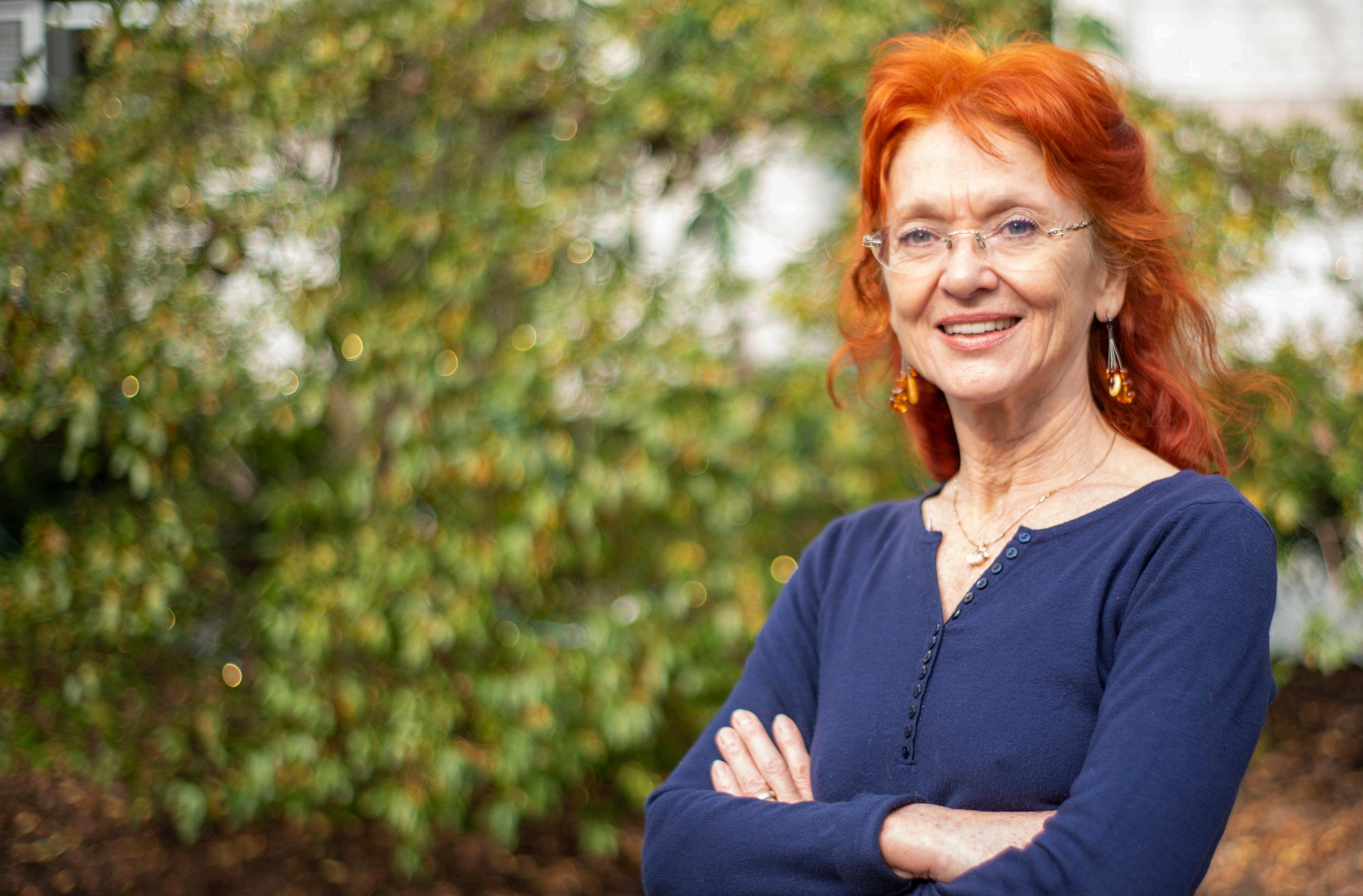
$2.1M DOE Award for Greenhouse Gas Sensor Technology on Drones
Professor Matteo Rinaldi, electrical and computer engineering, who is also director of the Northeastern SMART Center, has been awarded $2.1 million from the Department of Energy Advanced Research Projects Agency-Energy (ARPA-E) for “High-Performance and Miniaturized Greenhouse Gas Sensor for Drone-based Remote Sensing.” He will develop a palm-sized sensor that can be affixed to drones to scan acres of land faster, cheaper, more accurately, and with less power than the present shoebox-sized sensors found on stationary towers, allowing farmers to detect harmful nitrous oxide emissions on their land. Nitrous oxide is a key ingredient in agricultural fertilizer and harmful to the environment. The proposed system will use Rinaldi’s low-power, zero power pioneering smart sensor technology. It will also improve drone flight time by 50% and provide the kind of resolution required to monitor hot spots of nitrous oxide. Armed with the data, farmers can either improve soil management to reduce emissions if they are high, or they can claim carbon credit or some other forms of rewards if emissions are low.
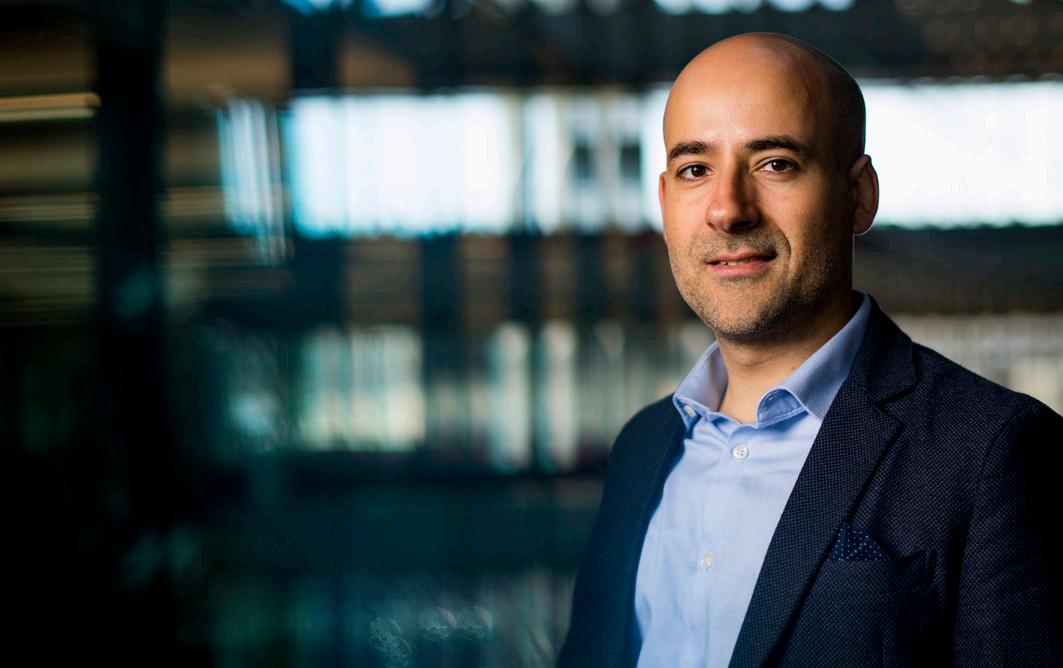
12 NORTHEASTERN UNIVERSITY ELECTRICAL AND COMPUTER ENGINEERING
Photo by Matthew Modoono
selected
$3M Award to Improve 5G and 6G Wireless Networks
Associate Professor Dimitrios Koutsonikolas, electrical and computer engineering, is leading a $2 million award from the National Science Foundation and an additional $1 million contribution from Northeastern University. The award will support research to increase communication speed and improve communication robustness in millimeter-wave (mmWave) frequency bands—making 5G and 6G wireless networks feasible for consumer bandwidth-intensive applications such as virtual reality and autonomous vehicles. The three-year grant supports the development of an open, programmable research platform called X-Mili, which will serve as a testbed for millimeter-wave transmitters and receivers. By optimizing the performance of these critical elements, the project will accelerate the commercialization of advanced wireless networks that address growing consumer demand. The innovative platform is the first to enable modeling and testing of both the hardware and software components of future wireless networks, which will drive system-level innovation. Coinvestigators on the project include electrical and computer engineering professors Stefano Basagni, Josep Jornet, and Tommaso Melodia
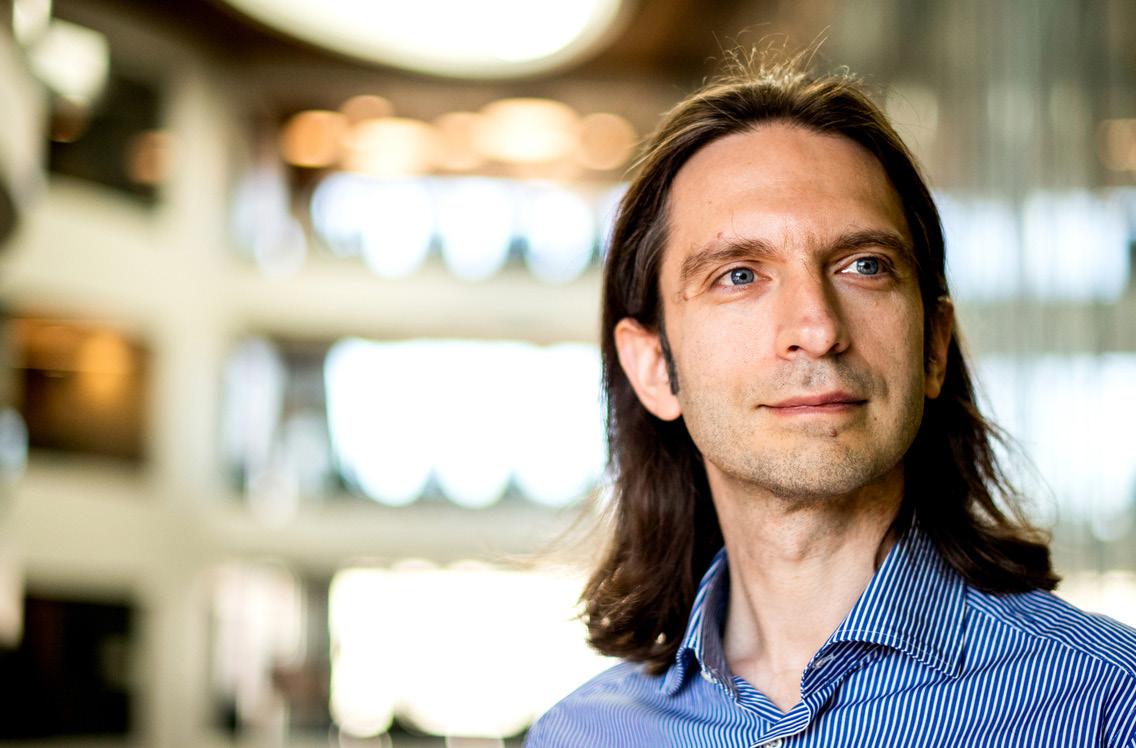
$15M NSF Award for Superconductor Research for Better, Faster Computing
Associate Professor Yanzhi Wang, electrical and computer engineering, is part of a multi-university team, called DISCoVER (Design & Integration of Superconductive Computation for Ventures beyond Exascale Realization) Expedition, which was awarded a $15 million six-year grant from the National Science Foundation’s Expeditions in Computing program.
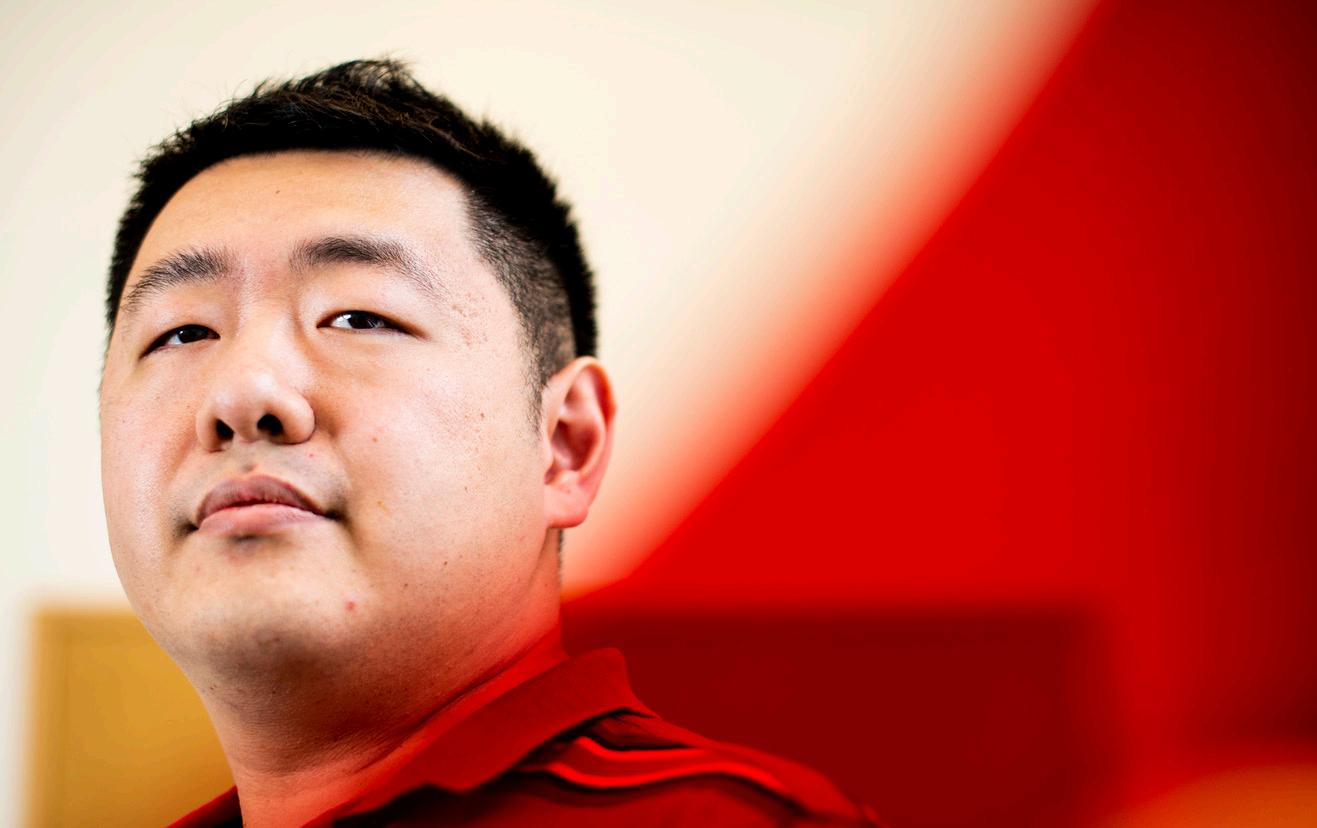
With collaborators from the University of Southern California, Cornell University, Auburn University, and the University of Rochester, Wang, who is a thrust leader, is exploring the use of novel superconductor electronics as a viable next step in computing technology. Superconductor electronics can deliver ultra-high performance and energy efficiency at scale, resulting in better, faster computing systems suitable for general use.
The team will use the grant to design and demonstrate a superconductive system of cryogenic computing cores (SuperSoCC), an artifact built from superconductive electronic components capable of yielding >100x improved energy efficiency at the same performance as CMOS—the small, battery-powered semiconductor chip that stores information in today’s traditional computers.
13ANNUAL REPORT 2021-2022
Photo by Ruby Wallau
Photo by Matthew Modoono
Faculty Grants and Publications
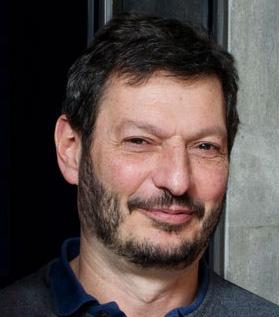
$1M NSF Award for Designing An Autonomous, Bat-inspired Aerial Robot
Assistant Professor Alireza Ramezani, electrical and computer engineering, in collaboration with Assistant Professor Lawson Wong, Northeastern Khoury College of Computer Sciences, and the University of CaliforniaBerkeley, is leading a $1 million National Science Foundation grant for “Design, Flight Control, and Autonomous Navigation of Bioinspired Morphing Micro
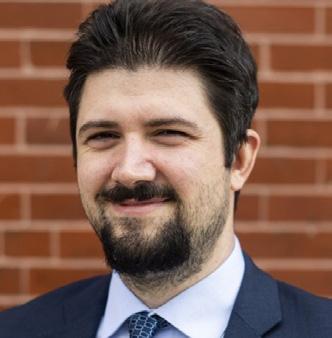
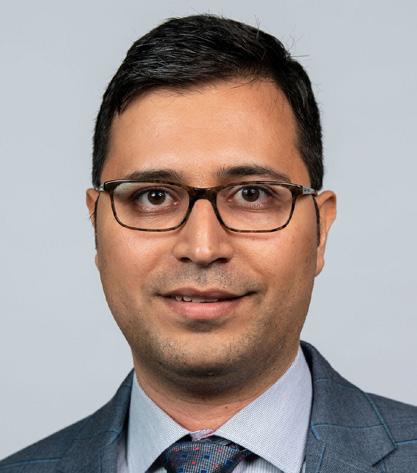
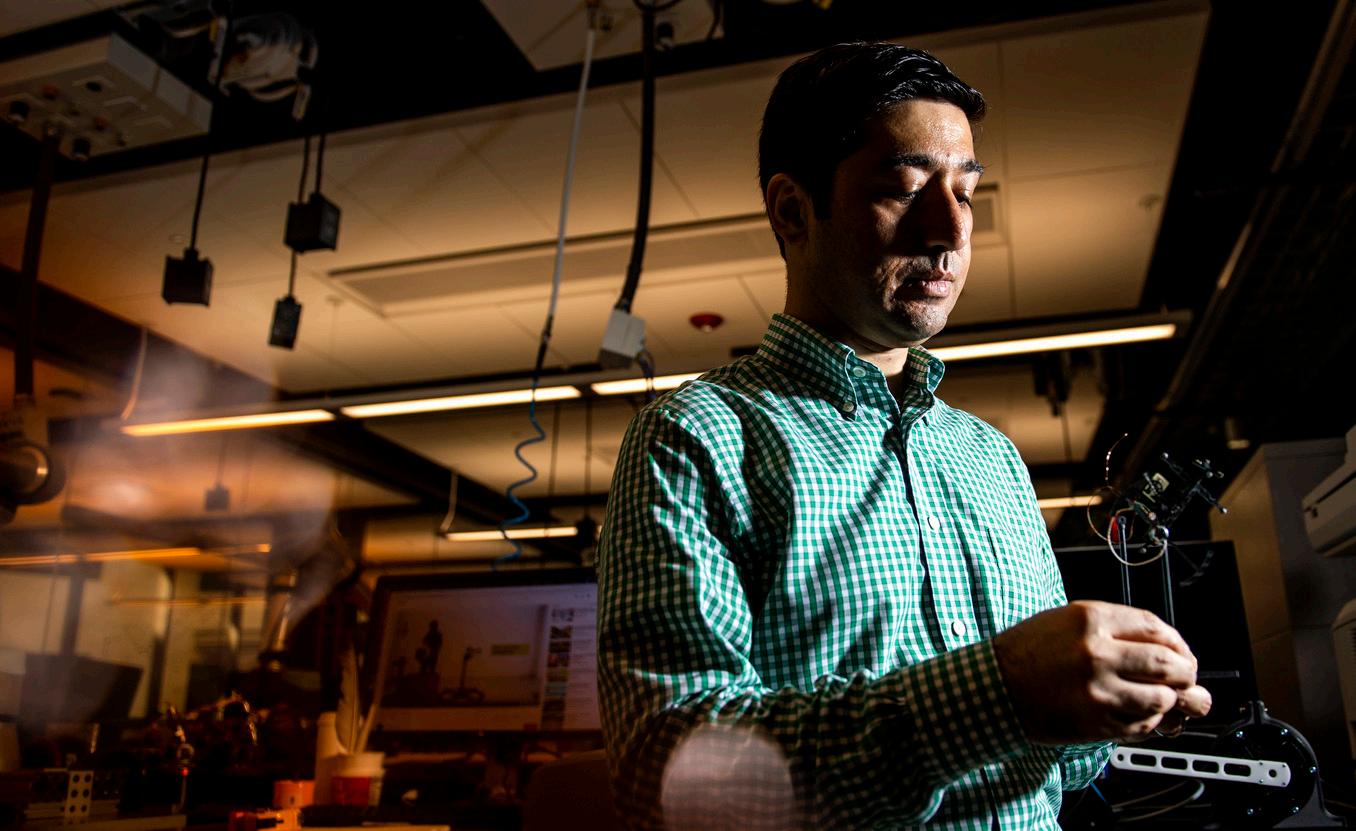
Aerial Vehicles for Operation in Confined Spaces.” They will create aerial, bat-inspired robots (drones) that can operate and navigate autonomously in extremely confined spaces, meeting an increased demand for fast, continuous environmental surveillance in city sewers.
$1M NSF Award for Data-Driven Model for Pandemic Preparedness
Assistant Professor Milad Siami and Dennis Picard Trustee Professor Mario Sznaier, electrical and computer engineering, in collaboration with NYU Tandon School of Engineering, received a $1.1 million National Science Foundation grant, titled “Modeling and Control of Non-Passive Networks with Distributed Time-Delays: Application in Epidemic Control.” They are developing a comprehensive framework for data-driven control of large-scale networks where time delays and the corresponding complex behavior play a substantial role such as with the COVID-19 pandemic. To enhance pandemic preparedness, it is imperative to generate accurate network models of our connected society and disease spread.
$1M NSF Award to Create Resilient, Energy Efficient, and Secure IoT Networks
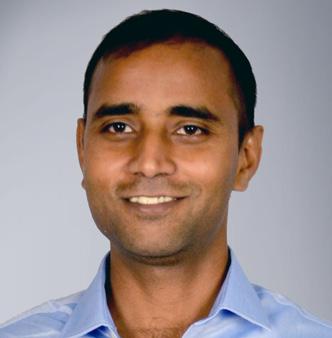
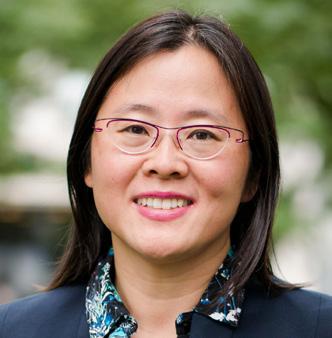
Associate Professor Marvin Onabajo, Professor Yunsi Fei, Assistant Professor Aatmesh Shrivastava, and Assistant Professor Francesco Restuccia, electrical and computer engineering, were awarded $1 million from the National Science Foundation for “RINGS: Internet of Things Resilience through Spectrum-Agile Circuits, Learning-Based Communications and Thermal Hardware Security.” RINGS, which stands for Resilient and Intelligent Next-Generation Systems, is a new multi-sector partnership created by the NSF to accelerate research in next-generation networking and computing systems. The Northeastern team will create spectrum-agile IoT networks with low-power adaptive radio frequency (RF) circuits at the sensor nodes, and with coordinated optimization and enhanced security at the edge device. The synergies between the circuits, computing, and wireless networking components of the research are anticipated to create a paradigm for resilient next-generation IoT networks with energy-efficient secure communication between sensor nodes and edge devices.
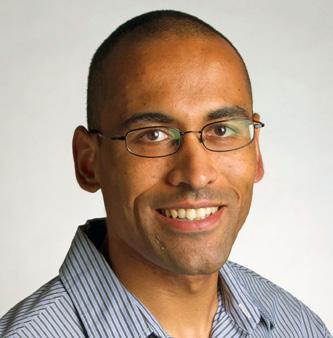
14 NORTHEASTERN UNIVERSITY ELECTRICAL AND COMPUTER ENGINEERING
Photo by Ruby Wallau
Photo by Ruby Wallau
Making 6G Possible: Time Sharing Method Demonstrated for First Time in Terahertz Band
Electrical and computer engineering faculty and researchers at Northeastern’s Institute for the Wireless Internet of Things have successfully tested a method that could allow telecommunication providers to move beyond 5G and into higher bandwidths. The research paper, titled “Dynamic Spectrum Sharing between Active and Passive Users Above 100 GHz” was published in Nature Communications Engineering and co-authored by Associate Professor Josep Jornet, Principal Research Scientist Michele Polese, William Lincoln Smith Professor Tommaso Melodia, Assistant Professor Francesco Restuccia, and Associate Research Scientist Viduneth Ariyarathna
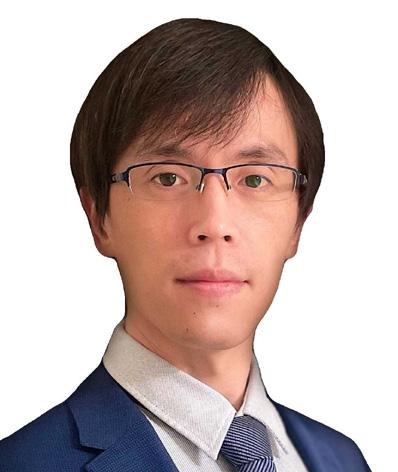
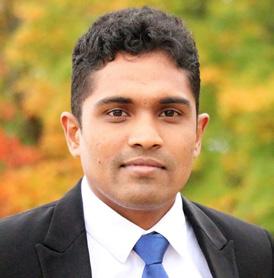
Self-Powered Sensorial ‘Skin’ the Future of Motion and Gesture Recognition
Groundbreaking research on flexible photodetectors with computational powers by Associate Professor Canek FuentesHernandez, electrical and computer engineering, and Dean of the College of Engineering Gregory D. Abowd, has been published in the Nature journal npj Flexible Electronics. The paper, titled “Flexible Computational Photodetectors for SelfPowered Activity Sensing,” describes a new approach to achieve motion and gesture recognition using arrays of thin and flexible organic photodetectors distributed in space. The arrays, called computational photodetectors, recognize human activity and operate with low latency (fast) while only using power harvested from light in the environment using a solar cell. They constitute a self-powered sensorial skin that sits on the surface of the objects, seamlessly augmenting our experience and ability to sense relevant information from the environment.
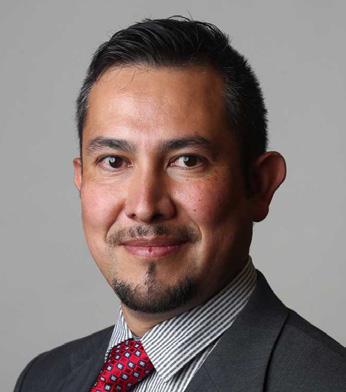
New Quantum Bit Platform Points to New Direction for Low-Cost, LargeScale Quantum Computers
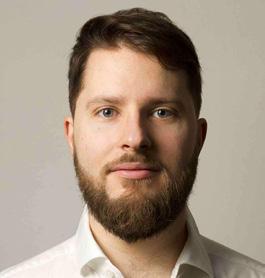
A paper, titled “Single Electrons on Solid Neon as a Solid-State Qubit Platform,” published in the journal Nature by Assistant Professor Xufeng Zhang, electrical and computer engineering, who had a key contribution in the quantum microwave measurements, and researchers at Argonne National Lab and other collaborative institutions, demonstrates a fundamentally new quantum bit (qubit) platform.
Research Featured on Cover of Nanoscale Advances
Electrical and Computer Engineering Professor Hossein Mosallaei’s research on “Multifunctional Metasails for Self-stabilized Beam-riding and Optical Communication” was featured on the cover of Nanoscale Advances
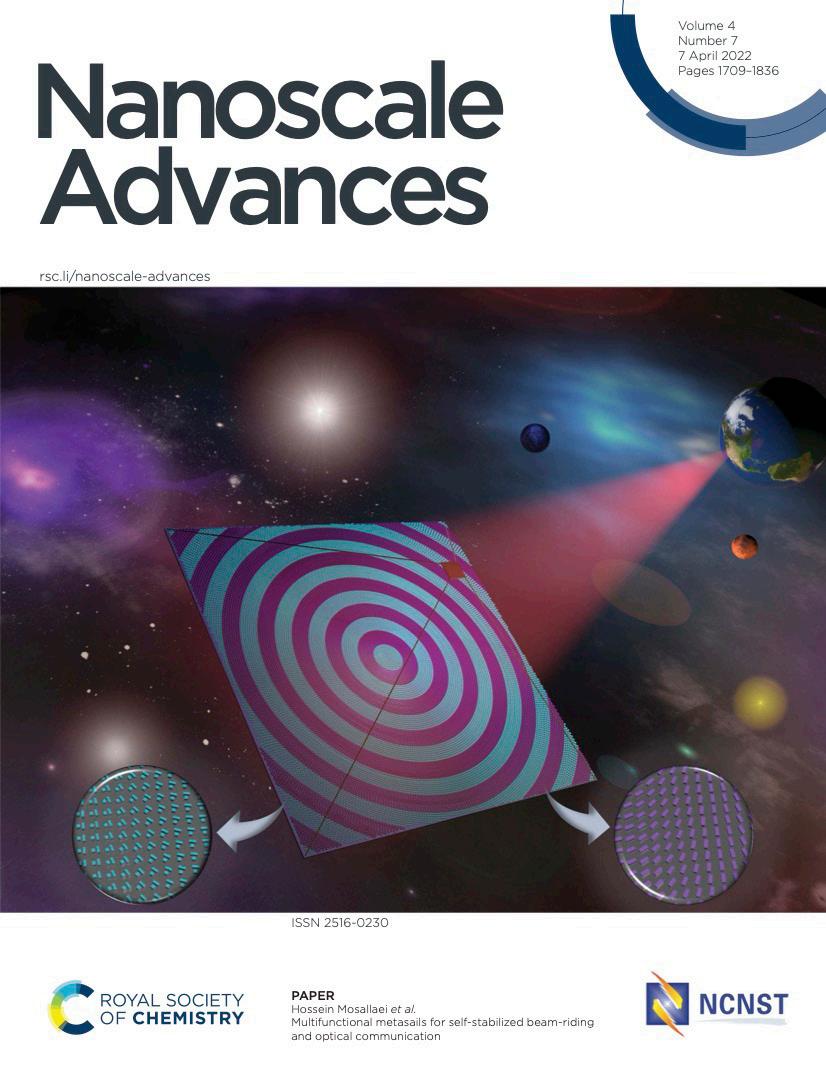
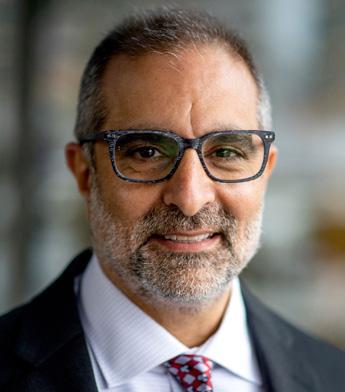
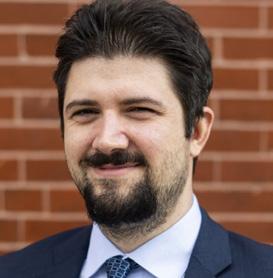
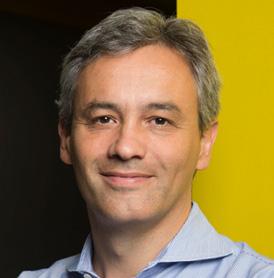
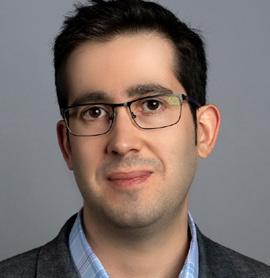
15ANNUAL REPORT 2021-2022
Student Successes
selected highlights
Finalist in NASA Big Idea Challenge
Students for the Exploration and Development of Space student group, advised by Assistant Professor Alireza Ramezani, electrical and computer engineering, was one of seven university teams selected as finalists in the 2022 NASA’s BIG Idea Challenge. The team’s project, titled “COBRA: Crater Observing Bio-inspired Rolling Articulator,” is a snakelike design for their robot to allow it to traverse the extreme terrains on the moon’s surface.
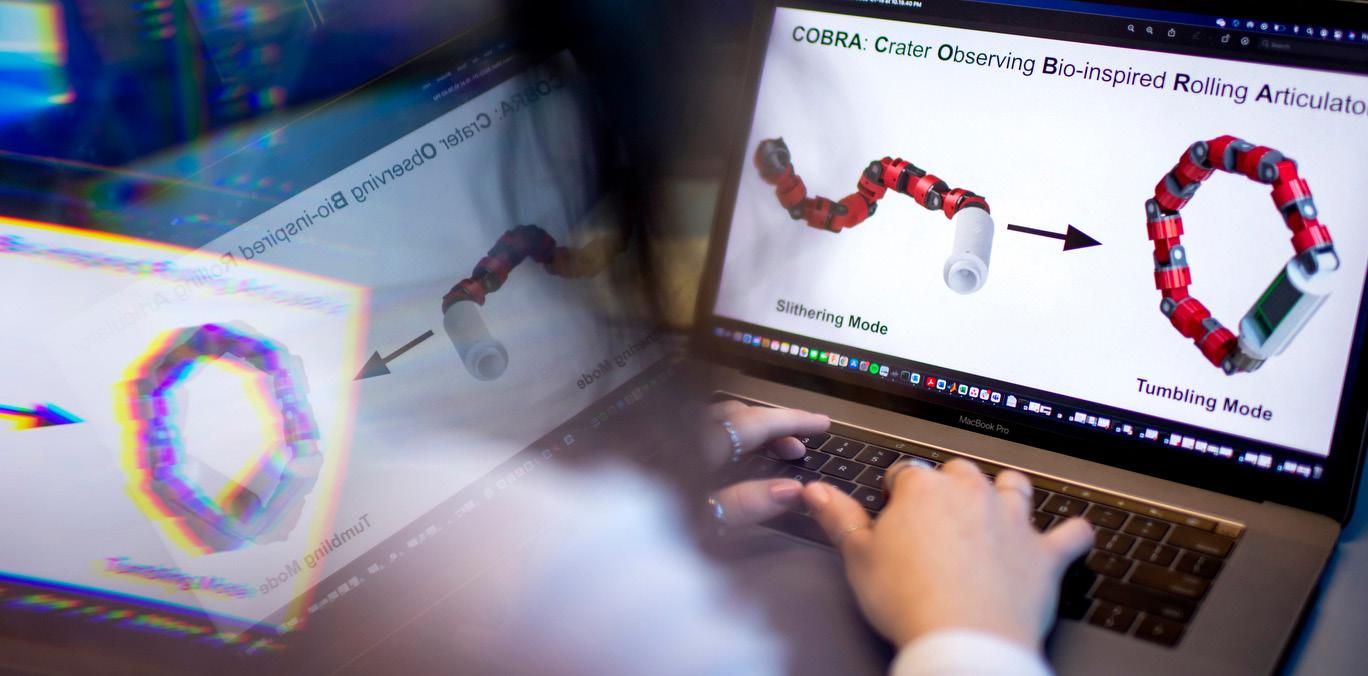
ACM-IEEE CS George Michael Memorial HPC Fellowship
Tirthak Patel, PhD’22, computer engineering, was selected as a recipient of the 2021 ACM-IEEE CS George Michael Memorial HPC Fellowship, for his contributions toward making current error-prone quantum computing systems more usable and helping high performance computing (HPC) programmers solve computationally challenging problems. He also received Northeastern’s 2022 Outstanding Graduate Student Award in Research for showing an exceptional ability to conduct high-level research and make contributions to the scholarly literature in their fields.
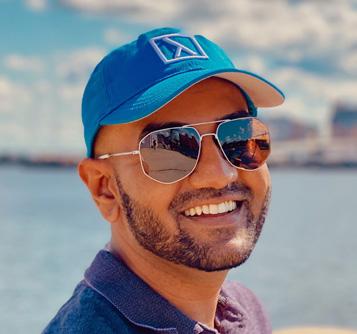
NSF Graduate Research Fellowship Program
Austin Lin, electrical engineering and physics, E’20, is a recipient of the National Science Foundation Graduate Research Fellowship. This prestigious award recognizes and supports outstanding graduate students who have demonstrated the potential to be high achieving scientists and engineers early in their careers.
Best Student Paper Award at IEEE EFTF/IFCS 2022
Xuanyi Zhao, PhD’23, electrical engineering, advised by Assistant Professor Cristian Cassella, electrical and computer engineering, won the Best Student Paper Award at the 2022 Joint Conference of the European Frequency and Time Forum & the IEEE International Frequency Control Symposium (IEEE EFTF/IFCS 2022) in Paris for his paper on “Improving Thermal Linearity and Quality Factor of AlScN Contour Mode Resonators Using Acoustic Metamaterials Based Lateral Anchors.”
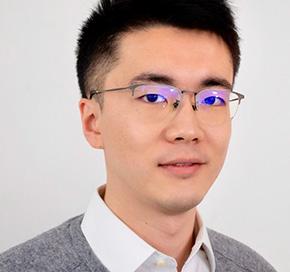
16 NORTHEASTERN UNIVERSITY ELECTRICAL AND COMPUTER ENGINEERING
Northeastern Electric Racing Team Places Second in Competition

The Northeastern Electric Racing team placed second in the all-electric vehicle category at the 2022 Formula Hybrid+Electric Competition, their first in-person competition after having spent the past 5 years building their first-ever vehicle and competing virtually the past two years. Northeastern Electric Racing is a student organization that designs and builds an all-electric formula-style race car to compete against other universities from around the world. They also won the inaugural Scrutineer’s Award in Honor of Suzanne Royce for being the most prepared team and having the best engineering documentation.
Fulbright-Canada Globalink Mitacs Award
Aditi Purandare, E‘23, electrical and computer engineering, received the Fulbright-Canada Globalink Mitacs Award. The scholarship enables American students to work on research projects for 12 weeks at different institutions in Canada. Purandare was matched with a project at the University of Toronto studying financial planning and portfolio optimization through data analytics and artificial intelligence.
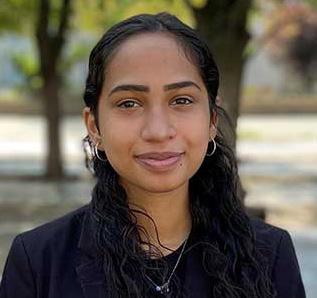
PETRA Best Student Paper Award
Kyle Lockwood, PhD’24, electrical and computer engineering, and co-authors received the Best Student Paper Award at PETRA 2022 (Corfu, Greece), with their paper titled “Leveraging Submovements for Prediction and Trajectory Planning for HumanRobot Handover.”
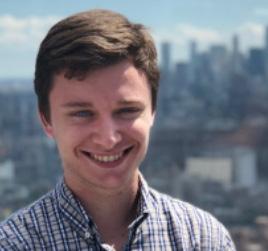
Best Poster at ACM CF22
Nicolas Agostini, PhD’23, computer engineering, advised by College of Engineering Distinguished Professor David Kaeli, electrical and computer engineering, won the Best Poster Award at the 19th ACM International Conference on Computing Frontiers (CF22) for his poster on “SODA-OPT an MLIR-based Flow for Co-design and High-level Synthesis.”
ACM TODAES Rookie Author of the Year Award
Shijin Duan, PhD’25, computer engineering, advised by Assistant Professor Xiaolin Xu, is the recipient of the prestigious ACM Transactions on Design Automation of Electronic Systems (TODAES) Rookie Author of the Year (RAY) Award, for their paper, titled “FPGAPRO: A Defense Framework Against Crosstalk-Induced Secret Leakage in FPGA.”
17ANNUAL REPORT 2021-2022
Student Spotlights
Global Research Co-op in Antarctica
Isabelle Brandicourt, E’23, electrical engineering, never imagined she would someday work with penguins in Antarctica. After planning to major in marine biology in college, she decided having “hard skills” was an advantage. She chose Northeastern for its co-op program, Boston location, and “campus feel.”
She was particularly interested in Northeastern’s Three Seas program, which offered students a way to fulfill a non-engineering minor by providing an opportunity to spend a semester studying in different marine environments.
For her first co-op, Brandicourt worked at Doble Engineering Company in Marlborough, Massachusetts, examining printed circuit boards to troubleshoot, test, and repair them, as well as identify potential failure points.
Following this she did a summer internship at the Woods Hole Oceanographic Institution, working to identify individual Emperor penguins among large colonies. The project involved placing GPS loggers on penguins, tagging them with RFID chips. Brandicourt helped design antennas to read each RFID tag, making it possible to track each penguin’s movement.
Her experience at WHOI led her to be invited to go to Antarctica for a research co-op. “I wanted to do this co-op primarily because of my interest in developing better ways to study marine life, the interaction in the ecosystem and the effects of climate change,” she explains.
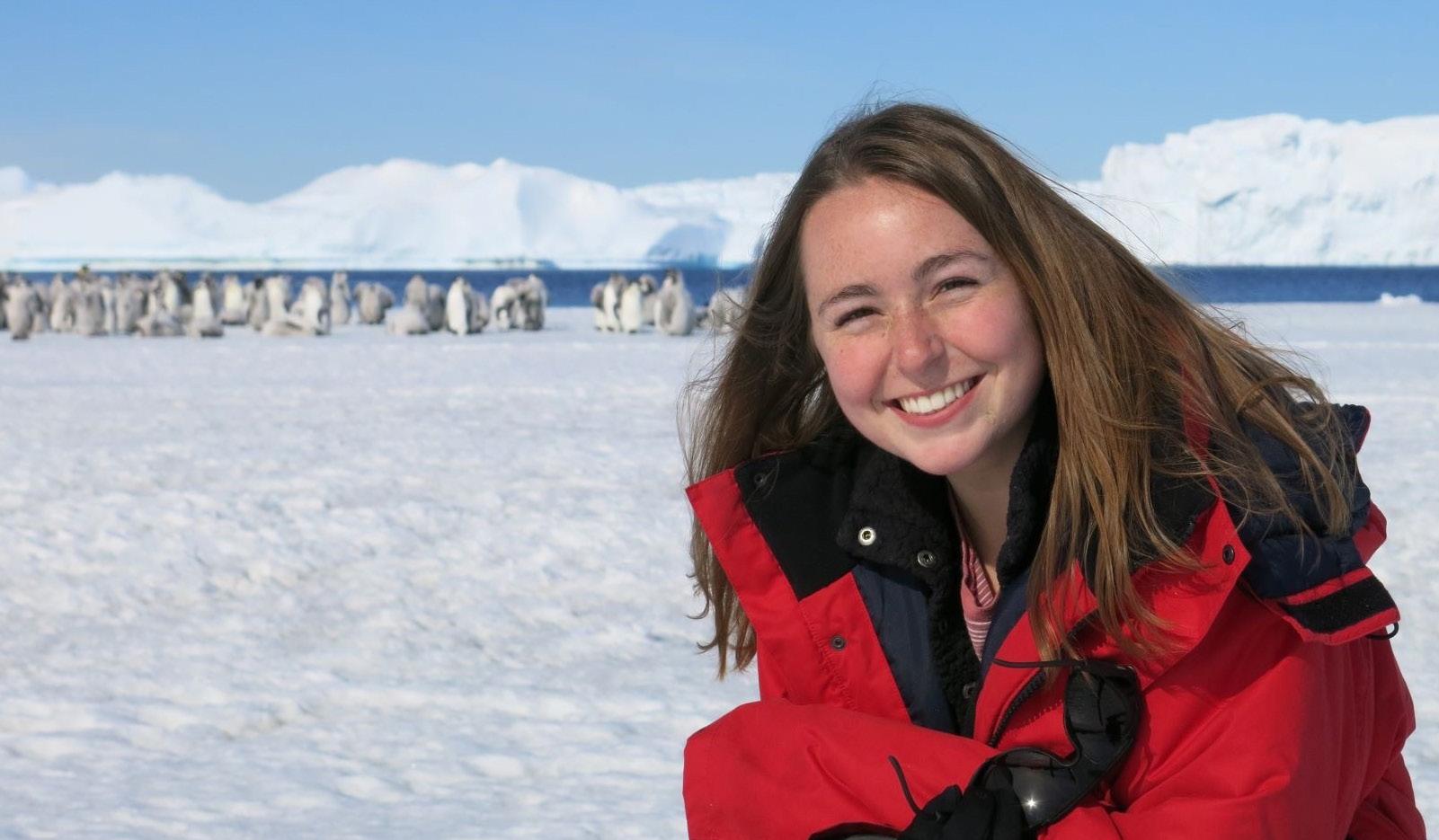
In Antarctica, Brandicourt tackled two major projects. The first drew heavily on engineering skills: building and installing camera systems designed to collect data on the speeds of penguins.
Her project recorded the speeds of the penguins going to sea and returning to land, and compared the results over time to develop a metric on the health of the ecosystem.
18 NORTHEASTERN UNIVERSITY ELECTRICAL AND COMPUTER ENGINEERING
Her second assignment proved stressful and gratifying. Brandicourt and a PhD student on the base maintained an Adélie penguin colony, which included hands-on monitoring and placing RFID tags in the chicks.

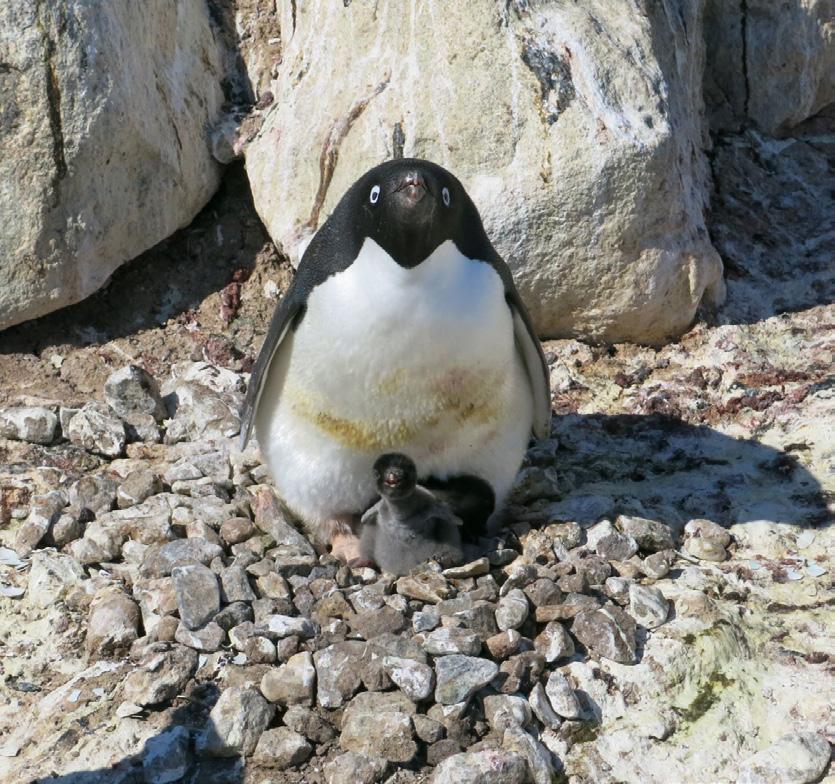

While chicks don’t yet know to fear humans, the adults are often wary, which requires handling them carefully and quickly. “We had to run after penguins as they were leaving the colony, catch them in a big net, then carry them the whole way to the hut where we did the procedure,” explains Brandicourt.
Although she was thrust into a lot of work she was unfamiliar with, including doing blood draws on penguins, Brandicourt “loved working every day with the penguins.”
Brandicourt says her co-ops gave her many ideas about her career. “You can take engineering in a lot of different directions that are not the traditional ones. It helped me a lot in thinking about where I’ll go after this, whether I want to go into industry or academia and research.”
19ANNUAL REPORT 2021-2022
Student Spotlights
Tirthak Patel, PhD’22
COMPUTER ENGINEERING Advised by Devesh Tiwari, Associate Professor of Electrical and Computer Engineering
After earning his bachelor’s degree in electrical engineering with honors from the University of Toronto, Tirthak Patel joined Northeastern to pursue his PhD.
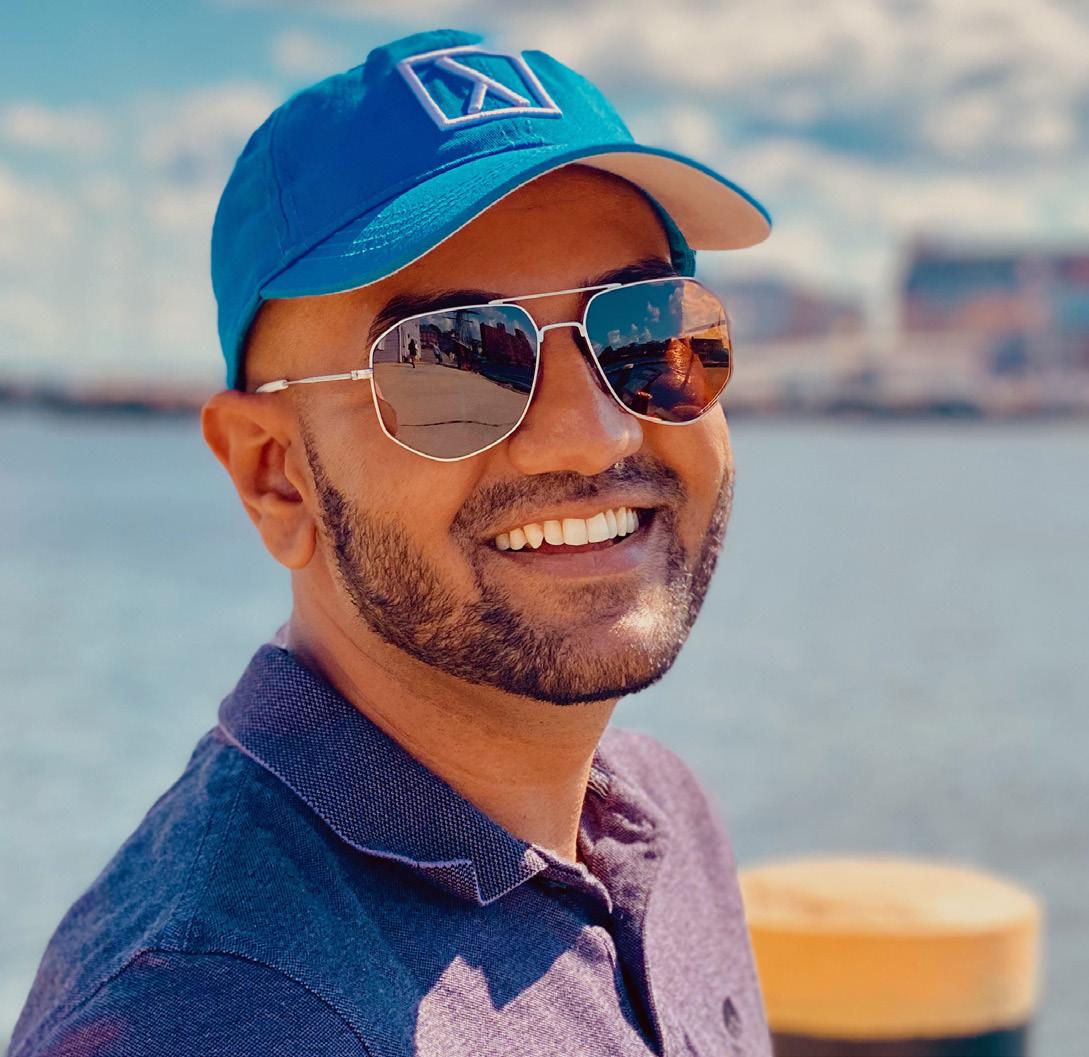
Patel’s research addresses the challenge of error-prone program executions on quantum computers and provides robust solutions to improve their reliability. While the field of quantum computing is rapidly advancing, relatively high noise on near-term quantum computers remains a fundamental roadblock prohibiting wider adoption. Due to the high noise levels, program executions on near-term quantum computers produce erroneous program outputs. Programmers largely lack the tools to estimate the correct output of these noisy program executions.
Patel’s research has focused on designing cross-layer system software for extracting meaningful output from erroneous program executions on quantum computers. In particular, he led the effort to benchmark and analyze the performance of different quantum algorithms on quantum computers. Patel leveraged the insights gained from this measurement-based experimental effort to inform the design of his novel software tools and methods.
He has published more than 35 rigorously peer-reviewed research papers. Patel also interned at Berkeley Lab, served on conference committees, reviewed journal papers, served as a teaching assistant, and delivered lectures about quantum computing at Northeastern.
In recognition of his research contributions, Patel received the Natural Sciences and Engineering Research Council of Canada Alexander Graham Bell Canada Graduate Scholarship, the Northeastern University College of Engineering Outstanding Graduate Research Award, the ACM-IEEE Computer Science George Michael Memorial High Performance Computing Fellowship, and the Northeastern University Outstanding Graduate Student Award in Research.
Following graduation, Patel will join Rice University’s School of Engineering in the fall of 2023 as an assistant professor of computer science.
20 NORTHEASTERN UNIVERSITY ELECTRICAL AND COMPUTER ENGINEERING
21ANNUAL REPORT 2021-2022 ece.northeastern.edu
from



COVER IMAGE
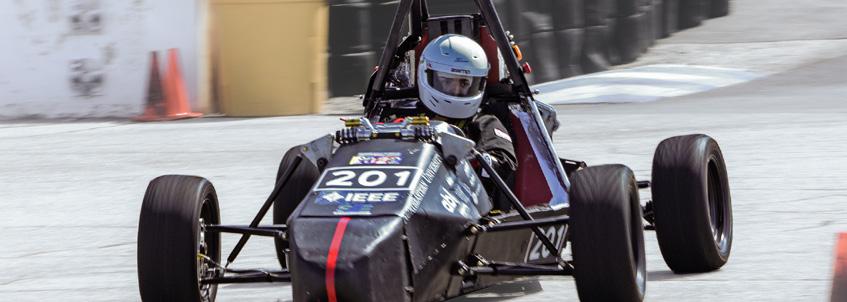
Professor Hanumant Singh (second from the left), electrical and computer engineering, jointly appointed in mechanical and industrial engineering, has been elevated to an IEEE Fellow for his development of localization and mapping techniques and autonomous systems for marine and polar applications. See the story on page 8.
Photo by Matthew Modoono/Northeastern University

409 Dana Research Center 360 Huntington Avenue Boston, MA 02115 P 617.373.4159 ece.northeastern.edu coe.northeastern.edu Letter
the Chair 1 Fast Facts 2 Faculty Honors & Research 10 Student Successes 16




































































